Financial Inclusion Challenge
Tiny Totos
By digitizing and monetizing transactions in the informal childcare economy, Tiny Totos has built a robust credit worthiness tool for unbanked women to borrow against.
What is the name of your solution?
Tiny Totos
Provide a one-line summary of your solution.
80% of African women work in the informal economy. 85% of women become mothers, paying for informal childcare to go to work. By digitizing and monetizing transactions in the informal childcare economy, Tiny Totos has built a robust creditworthiness tool for unbanked women to borrow against.
Film your elevator pitch.
What specific problem are you solving?
TTK is addressing a systemic, societal problem that most directly affects women and their children at the most vulnerable periods of their lives. For women, their ability to earn is most precarious during the years right after they have given birth, when becoming a mother puts a handicap on their ability to invest and grow their careers. Securing decent childcare to go to work and care for one's family is a challenge everywhere, but all the harder in deprived urban areas of East Africa where poverty is high and standards if you cannot afford to pay for it, deplorably low. For those who can pay for it, there are a range of world class options, largely enabled by private sector investment given the strong prospects of returns. However for the vast majority of mothers in Africa (85% of women will become mothers on the continent), quality high cost childcare is woefully out of reach. Tiny Totos’ solution focuses on the majority segment of the childcare market that caters to the 80% or more of African women who work in the informal economy, earn little, and must resort to for their childcare needs.
Low income mothers in the informal economy are typically unskilled and undereducated, working in lowly paid or unregistered jobs or selling services of their own, while earning at or below the poverty line. These mothers typically earn anywhere from $30-250 USD a month, spend 17-20% of earnings in childcare. Mothers residing in slums are more poorly educated and less likely to receive antenatal care and skilled birth assistance. The women who look after their children are those with no other opportunities for gainful employment. With limited pre primary support from 4, and formal schooling only beginning en masse at 6, children growing up in what amount to babysitter bus stops brains are deprived of stimulation and fail to meet expected developmental milestones. For typical standards of informal childcare provide little more than an adult presence in the room - no learning, nutrition, safety standards, oversight. With 90% of brains developing by aged 5, it is no wonder that deprived of age appropriate stimulation, the ratio of only 1 in 5 children in Kenya accessing quality care is the same as the ratio for children finishing primary school in Kenya who have met basic standard of attainment. The failure of human capacity development in Africa does not have its origins in the formal school years; for the majority, the origins are set before children have ever set foot in school.
Unlike the rest of the world, Africa's population continues to grow. By 2055, the continent will have 1 billion children. If this growth continues unabated, without scaleable, community-driven solutions to provide childcare support to working women, low income women and children alike will fall deeper into the poverty trap. The scale of the problem is immense; by turning childcare crisis from crisis to opportunity, we can transform the lives of millions of disadvantaged women and children in Africa.
What is your solution?
Tiny Totos (TTK) is a Kenyan social enterprise with a social franchise model working to ensure all children enjoy access to quality care. We provide informal daycares with a practical, user-designed coaching programme consisting of in-person childcare and business training complimented by tech-enabled learning support and a phone-based app to enable them to professionalize their businesses, and manage operations, track financials and childcare / customer impacts. We forge a network of trusted female caregivers delivering quality care from the substandard, fragmented informal economy.
One key element of our support is digitising cash transactions in the informal economy. We use this data on payments and earnings to gauge eligibility for asset based financing for both business owners and parents in the network. Frequent attending parents can qualify; drop ins are seen as credit risk and cannot. Managers are eligible as soon as their records are robust and regular; quantum of capital determined by income. Tiny Totos' financing is geared towards either enabling owners and parents to acquire hardware such as clean cookstoves, water filters or smart phones designed to improve standards of care for children at home or at daycares, or engagement of users in the network.
Our innovation, beyond digitizing the cash-based, invisible economy of childcare, is to give mothers working in the informal economy a fair, alternative means of determining credit worthiness. Women without bank accounts, formal employment, work contracts or assets, who rarely use mobile money because of the overhead transaction costs, simply cannot access finance at fair terms. Lacking traditional denominators of creditworthiness, Tiny Totos has created an entirely new one - payment and earnings from childcare.
We know that women spend 17-20% of their income on childcare. Extrapolating from that figure, and assessing their childcare payment frequency per month, we have defined an alternative methodology for determining credit worthiness of working mothers in our network, based not on what they have, but what they spend on. Using this metric we have issued almost 500 micro loans with only one part-time financing officer. Our Know your Customer screen is accurate; we face only single digit arrears. Loan defaults are rare, not only because our terms are fair (10-12% interest, unsecured) but also because were they to default, they would lose the main service that enables them to go to work - childcare. For business owners, we use monthly earnings to determine the size loans at what repayment rates they can manage to service responsibly. We issue asset-based financing loans, so there is no risk of another family member spending funds on something else. Using payments for childcare as an alternative denominator of reliability to create credit scores and creditworthiness provides financial access and inclusion for low-income women excluded from the formal economy as they invariably lack formal credit indicators - so get no credit or pay usurious rates if they secure any at all. Using childcare payments and earnings for credit rating builds opportunity and benefits for the financially excluded - low income mothers and children.
Who does your solution serve, and in what ways will the solution impact their lives?
Those who lives will benefit most from our intervention include:
1. Lower income children. Preschool children suffer enormously in informal settlements from inadequate access to clean water, electricity and health facilities, poor nutrition, education and sanitation services. They may survive; but will not thrive in these settings.
2. Low income working mothers. Mothers in the informal economy, who are typically unskilled and undereducated, earning at or below the poverty line
3. Women childcare providers. Often the least skilled and unemployable in the community; daycare is a default livelihood pursuit not a vocation, for which they earn little, and receive no support.
Our intervention prioritizes these disadvantaged groups, addressing the core need that holds them all back from fulfilling their full potential - lack of childcare. Without childcare, low income women cannot focus on building a career or earning a living, as they constantly experience disruption because of unstable childcare arrangements that make it impossible to focus on work, or for their children to remain safe and healthy. Children cannot grow to their full potential, and struggle to catch up from the lost early years for the rest of their lives. Community babysitters eke out a living from their profession, and have no motivation or means to improve standards of care.
Our model is unique in that it builds on networks of trust and economies that already exist. Although informal care is largely substandard, strong social networks of trust exist in the informal care economy. Rather than replace these by parachuting in a solution from the outside, our model builds on the transactions and marketplace that already exist, coaching owners to improve business performance, childcare standards and giving them access to capital through our alternative credit scheme to elevate standards to a level that the local market can afford. Our work over the past 7 years has shown informal markets can be transformed with the injection of the same support tools that every small business needs to get ahead - technology, capital, training and network. By aggregating and professionalizing the informal childcare market, and promoting digital innovation and digital access, to building the infrastructure to create unprecedented analytics of the informal childcare economy from which credit profiles and access to finance for hard working mothers labouring in undocumented professions can be forged, we are building value and opportunity that millions of disadvantaged women and children in Africa could benefit from, at scale.
Tiny Totos aims to become Africa’s largest childcare community network. As our use of childcare payments as alternative forms of collateral to vet access to finance applications is scaled, opportunities to partner with formal finance institutions to help scale the quantum of finance we can deliver will grow commensurately. With SOLVE's help we can scale financial inclusion innovation for disadvantaged women throughout Africa by giving them access to fair credit based on how they care for and invest in their most important asset of all - their children.
How are you and your team well-positioned to deliver this solution?
Our staff and board team are uniquely well positioned to deliver on the programme at hand. We have a team of 20 full time and 32 part-time staff, all based in Nairobi Kenya. Of our 52 staff, 50 are Kenyans, 1 (the founder) is a Kenyan resident with 11+ years in Kenya.
Our senior management team consists of Emma Caddy, our founder with 20 years’ experience operating at the nexus between sustainable investment, financial innovation and social impact development. Emma has an MBA with Distinction from Oxford’s Said Business School where she was a Skoll Scholar in Social Entrepreneurship. Joseph Walumbe, our Chief Financial Officer with over 11 years’ experience working in banking, administration and ICT, an MBA in Strategic Management. Jannik Henriks, our Managing Director, in charge of leveraging new technology, such as automation, chatbots, apps/ mobile, to create innovative solutions in the intersection of technology, business and people. Karungari Wachira, our People and Partnerships Director. Karungari has an International Education Policy and Planning Master of Arts from Columbia University. She was previously Project Manager at Adam Smith International where she was responsible for managing a £36.4m DFID funded Kenya Essential Education Programme (KEEP) to improve educational access, equity and quality for Kenya's most disadvantaged primary school students. Finally, Roselynn Awii, TTK’s Training Content Manager; a Learning Designer and Instructional coach, with over 10 years’ experience designing top notch educational programs contextualized for school leaders. Roselynn has a Masters of Education from Kenyatta University and is an Acumen Academy fellow. All live and work in Nairobi
Our Board Chair is Mary Ann Musangi, CEO of Haco Industries Kenya, a leading FMCG manufacturer and supplier in East Africa. Mary Ann, who holds an MSc in Management from University of Surrey,has over 20 years of experience in marketing and Brand Management having worked for the Coca-Cola Company, Kenya Commercial Bank, GlaxoSmithKline and Ogilvy Mather. Mary sits on over 7 boards, including a technology company that her family owns called Smart Applciations, as well as Sidian Bank, UAP Investments Ltd, Capital FM and the Kenya Association of Manufacturers. Mary Ann's personal experience as a Kenyan woman businesswoman in marketing, finance and technology affords Tiny Totos unique networks and insights to grow our work.
Our field office in Buru Buru, Nairobi, is located in the heart of the communities we work in and has an open door policy. Our field team visits every daycare regularly, as well as holding monthly training programme with all members. Our technology platforms have been designed with deep user engagement, with our team having learned from 3 past failures to build tools that low income women understand, want to use and can benefit from. We have a local community board providing feedback to our work. We maintain whatsapp groups for all members, and a freephone for enquiries. We are in sum, deeply embedded in the communities we work with, understand their needs, and track the impact of our work on a daily basis.
Which dimension of the Challenge does your solution most closely address?
Provide new ways to accurately assess credit-worthiness of MSMEs and individuals, including methods that reduce bias against borrowers who have traditionally lacked equitable access to credit
In what city, town, or region is your solution team headquartered?
Nairobi
In what country is your solution team headquartered?
What is your solution’s stage of development?
Growth: An organization with an established product, service, or business model that is rolled out in one or more communities
How many people does your solution currently serve?
From 2017-2022 served 19,500 children and 18,500 women, or 38,000 direct beneficiaries. We expect to serve 20,000 in 2023 alone. In 2022 we expanded from working exclusively in Nairobi to partnering with SOS Kenya and SOS Somalia to expand our remit into Mogadishu, Mombasa and Kisumu. In 2023 we signed a partnership agreement with Mercy Corps to pilot our childcare model in Addis Ababa. Both require localization of our manager, parent and field work apps as well as our in construction e-learning platform where our training content and support materials are building housed. We recently invited to present the impact of our model at the Impact First Development Summit (https://www.impactfirst.com/) in Portugal, where it became clear that we are both groundbreaking in our work and also facing technology scaling challenges common to huge development agencies with annual budgets dwarfing ours. The beauty of our model is that being a lean, community-based organization, we have been able to build far more for far less. We remain in the awkward space of too small to fund for large organization like GAVI and the UN, who nevertheless tell us how much they admire our work. With SOLVE and MIT's support, we believe we can get not only the financial but also technical resources we need to scale our impact numbers exponentially, and achieve our ultimate goal of helping 1 million women and children access improved childcare by 2030.
Why are you applying to Solve?
We are applying to SOLVE because, as mentioned above, we are in a critical growth stage where technical know-how as much as money (indeed money if raised would be invested in technical know-how or software development, not capital assets or infrastructure) is needed to progress our solution to position beyond growth, to scale. The digital and financial innovation of our childcare solution have attracted global interest and acclaim, from being voted best enterprise at the UN Women's Entrepreneurship Accelerator programme global competition in 2023, to making the Yale Startup Review (YASR) list of top 30 founders and startups shaping the future of Africa with entrepreneurship in 2022, to being invited to run a workshop and co-present on our work using digital technology to promote learning at UNESCO's Mobile Learning Week in 2020, to winning the MIT Innovation Challenge competitions for Africa and the Peoples' Choice award in 2020. These accolades speak to our potential - but in order to realize it, much in common to the women and children's whose potential we aim to unleash through improved, stable, affordable childcare - we need technical advisory as much as awards and recognition to scale.
We are applying to SOLVE to be part of a community at the vanguard of innovations in using digital solutions to overcome global inequity. From our experience partnering with EY's Ripple Programme and Harvard's Centre for Public Health on technical advisory support only (no cash) we know how valuable technical input that we otherwise could never possibly afford can be in helping us professionalize our work far beyond the scope of budget. EY helped us build a power bi data dashboard to track our intervention's impact across business, childcare, child outputs and parental engagement metrics, while Harvard's Centre for Public Health helped our team review and improve our childcare and child output measurement frameworks to ensure our data on impact was robust. Our experiences of these two ongoing technical intervention support experiences, along with our positive experience of being part of social enterprise networks, most notably the Draper Richards Kaplan Foundation network as a DRK funded venture and alum, have shown us how valuable such associations can be to advancing the quality and innovations of our work. We look forward to being part of the SOLVE community and learning from our peers if fortunate enough to be successful in this challenge application.
In which of the following areas do you most need partners or support?
Who is the Team Lead for your solution?
MD Jannik Henriks
What makes your solution innovative?
Our solution represents an innovative, yet eminently practical approach for solving Africa’s childcare crisis. We took the time to recognize that the only way to truly solve Africa's childcare crisis at scale was to work with what already existed at the community, rather than impose solutions from outside. We accepted that African states – like many others around the world – cannot afford to pay for universal preschool childcare. We saw that in the absence of state services, families turn to the informal community childcare market and community caregivers who mothers trust to look after their children while out at work. Rather than a charity mindset seeing only beneficiaries needing aid, we dignified and dignify childcare providers as struggling businesswomen, and recognized the informal childcare market as a market. We saw that even with the poor standards of informal care, mothers and parents still pay for childcare service – market foundations to build on. We proved that mothers can and will pay more for better service if available. We showed that payments for childcare can serve as alternative KYC schemes to approve financing to those paying for and earning from childcare; that with extensive mobile penetration, technology could build network, standardization and community. We carefully curated a practical, user-focused approach for upgrading informal childcare that low-income African women could understand and support – recognizing our role as a catalytic incubator programme helping them do what they already do, just better.
Our 8+ years of practical experiential model testing have borne out these assumptions. Through trial, error, and by listening to and integrating the feedback of childcare providers and users themselves, we have crafted a highly effective mentorship programme that prepares childcare providers in the critical fields of child health, education, learning, business management, leadership and data collection. Along with access to capital and network, we give informal childcare providers a practical toolkit to transform standards of care. A data-driven organization, we have built a deep database of holistic evidence to prove that Tiny Totos’ training, capital and network transforms informal babysitters into profitable childcare entrepreneurs who equate improved care with improved benefits for themselves, and are thus motivated to invest in continuous service improvement. We track child service, business, parental engagement and child development and health outcomes regularly, across our network. Children in our network score higher than national average development milestone outcomes, and have reduced indicators of malnutrition. Mothers can go to work and earn a living with peace of mind. Improved childcare institutions can sustain itself from local user payments. All benefit.
The childcare challenge we are solving is found in every town, city and village in Africa. Our solution can be adopted across every town, city and village in Africa as well. A universal problem with a universal solution that builds on, rather than replaces local agency is why Tiny Totos' solution is so innovative, and has the potential to transform lives of millions of women and children across the continent.
What are your impact goals for the next year and the next five years, and how will you achieve them?
Our impact goals for next year to end 2024 are to consolidate our platforms for scale. Primarily, our e-learning platform, but also to refine our apps (they are operational and robust but change requests arise) and to improve the management of communication and social network.
By the end of 2024 we aim to have:
- Consolidated our social franchise learning and operating systems
- 500 daycares in our network - primarily direct partners, also indirect
- Have 7,500 users in the open market
- Be operating across at least 3 countries in E.Africa
- Have enabled over 100,000 women and children access improved childcare (as attested by evidence collected across our childcare quality, child output, business and parent engagement holistic impact framework)
- Have provided financing to 10,000, and credit screening profiles for all
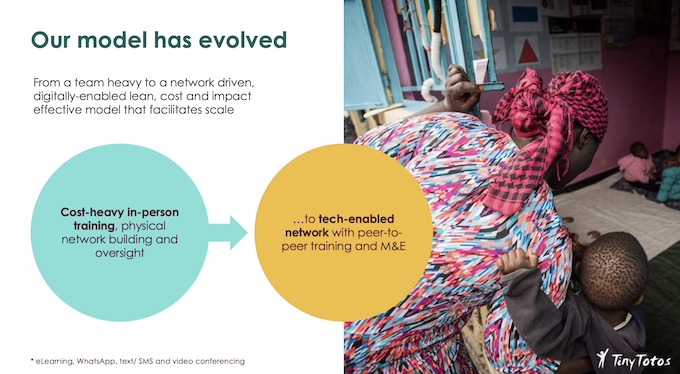
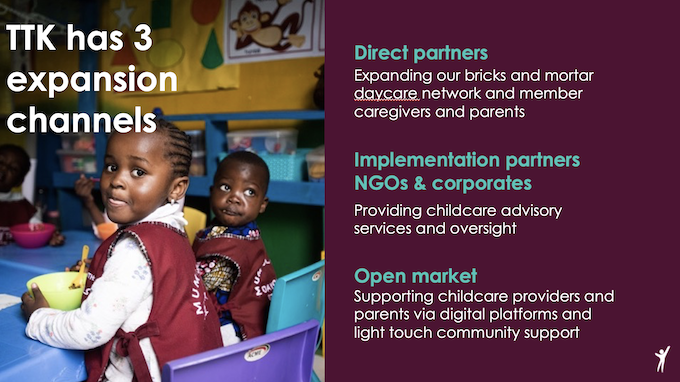
Our impact goal by 2030 is to be helping 1 million African women and children access improved childcare every year.
By 2030 we aim to have
- 3,500 daycare partners
- 125,00 individual subscribers
- 1m women and children directly benefitting from improved childcare (as attested by evidence collected across our childcare quality, child output, business and parent engagement holistic impact framework)
- Be operating across 5 countries in the region, and at least 1 in W.Africa
- Have at least one regional financing partner, who has adopted our alternative credit rating scheme to roll out and scale the suite of financial products available for our members - not limiting themselves to just sale of (healthy, cost-saving) household products as we do now, but growing into a whole new domain of health and education insurance products as well as small business loans for auxiliary services to our core network partners, daycares (eg.seamstresses to make aprons for the daycares to marketsellers providing food for the kitchens to carpenters and more). The sky is frankly the limit.
Our forecasting model is below.

Which of the UN Sustainable Development Goals does your solution address?
How are you measuring your progress toward your impact goals?
We measure across 4 key areas of impact - +1
1. Quality of childcare. We measure quality across a range of metrics (health and safety, learning, nutrition, evidence of management / leadership, business - record keeping, accuracy) periodically through the lifetime of a daycare's partnership with us. We measure at baseline and periodically after that by month, and once a certain standard of performance has been reached, quarterly.
2. Business metrics - are they keeping records accurately? And are they performing sufficiently well to meet their costs and make profit?
3. We measure child development outcomes using CREDI - a Harvard measurement tool that assesses child development across the 4 key domains up to age 3. We also screen children to see if they are on the aspired growth curve, and collect their vaccine data to check for gaps and try fill these.
4. We measure parent engagement and satisfaction with the network across a range of metrics - from whether they turn up to parent meetings they are invited to, to whether they join whatsapp groups and are active on them, to whether they increase attendance over time, spend more money, buy more products, take loans for larger products, redeem loyalty points and more. All those metrics are corroborated by a periodic survey.
Our + 1 is that we also measure network indicators, ie
- How many children are we working with?
- How many daycares?
- In how many localities?
- With what unit economic costs? Our goal is to consistently aim for reduced unit economic costs of onboarding and supporting daycares. With digitization this is being achieved by default - once 50% of our daycares began reporting via app, the data team found their work load reducing overnight by 33%. Once we are at 90%+ digitized data reporting, with the e-learning platform built enabling standardization of training facilitated by trainer of trainers rather than experts in the room, we will be able to reach and onboard more partners, while maintaining integrity of message and service, for less.

Our data team then summarizes these findings in our power bi data dashboard built by EY London through a low bono secondment project (which they also trained our team to use) and then presents them to the team for review on a monthly basis. We have a pack of around 50 slides of data - the snapshot below represents the first summary page.

We are constantly receiving praise for the depth and breadth and robustness of our data sets, unique in our field and remarkable given our modest budget. We look forward to sharing deeper data insights on the hitherto invisible, undocumented care economy with SOLVE, and discussing with the SOLVE team and network what more we can do and learn and influence from our data if we are fortunate enough to progress further with this opportunity.
What is your theory of change?
TTK’s theory of change aims to achieve three primary desired outcomes:
1. Children (no matter their backgrounds) can access quality early learning through play and meet health and development milestones
2. Community-based care is delivered by informed, trusted, influential childcare leaders for whom early learning care represents a sustainable and fulfilling livelihood pursuit.
3. A network of reliable, quality care providers is created, affording working mothers peace of mind to focus on their careers, while providing economies of scale so childcare and additional aligned services (and partnerships) are affordable and accessible to all.
TTK achieves these outcomes by providing training in childcare (early learning, health, safety and nutrition), business management, leadership and technology by creating a network of care givers whose in-person and virtual interactions reinforce behaviour change and adoption of best practices. By connecting hard to reach families in a dynamic, organic community of carers, non-traditional actors from private sector (eg Johnson & Johnson’s, Unilever) and traditional state partners (departments of health, education) are motivated to partner with the network to boost services, lower costs, increase opportunities to members.
These strategies interact and build upon each other to influence targets, which include:
1. Transformation of informal substandard care to profitable, well-run, community-based childcares, elevating community standards through a network effect
2. Improvements in childcare provider confidence, job satisfaction, and mental health, and ability to influence parents to prioritize best practices in childcare
3. Channels of access to children through which any play based learning content can be delivered
Our theory of change is depicted in the image below. To corroborate our holistic theory of change and the evidence that this does lead to positive outcomes for women's economic empowerment and sense of self, as well as child improvements, we have included further images and snapshots of data sets attesting to these aspired outcomes. We are constantly being recognized for our data-driven approach, and for punching well above our weight in terms of rigorously and regularly collecting a systematic range of holistic data to peak to the impact of our work. As remarked by one of our research and impact advisors, Dr Anuraj Shankar from the University of Oxford:
“Tiny Totos is a pioneer in development and use of digital systems to power high impact childcare for all. Their approach transforms the informal childcare economy into a scalable, advanced care system that brings services to thousands of children and families daily, ensuring no one is left behind as we build the next generation.” Dr Anuraj Shankar
Dr Shankar leads community health research at Oxford University Clinical Research Unit (OUCRU) and is a research fellow at Oxford University's Nuffield Department of Medicine.




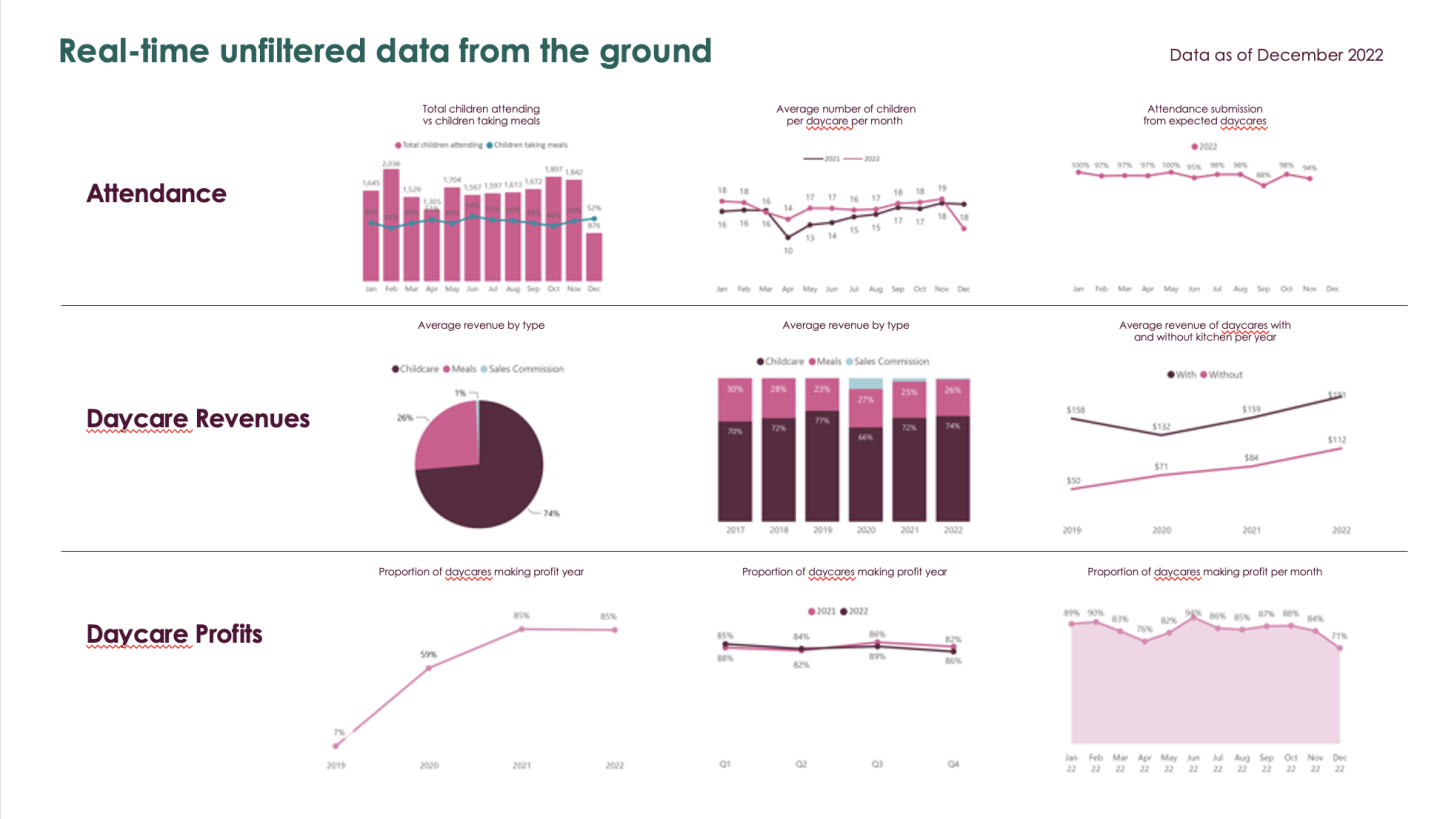
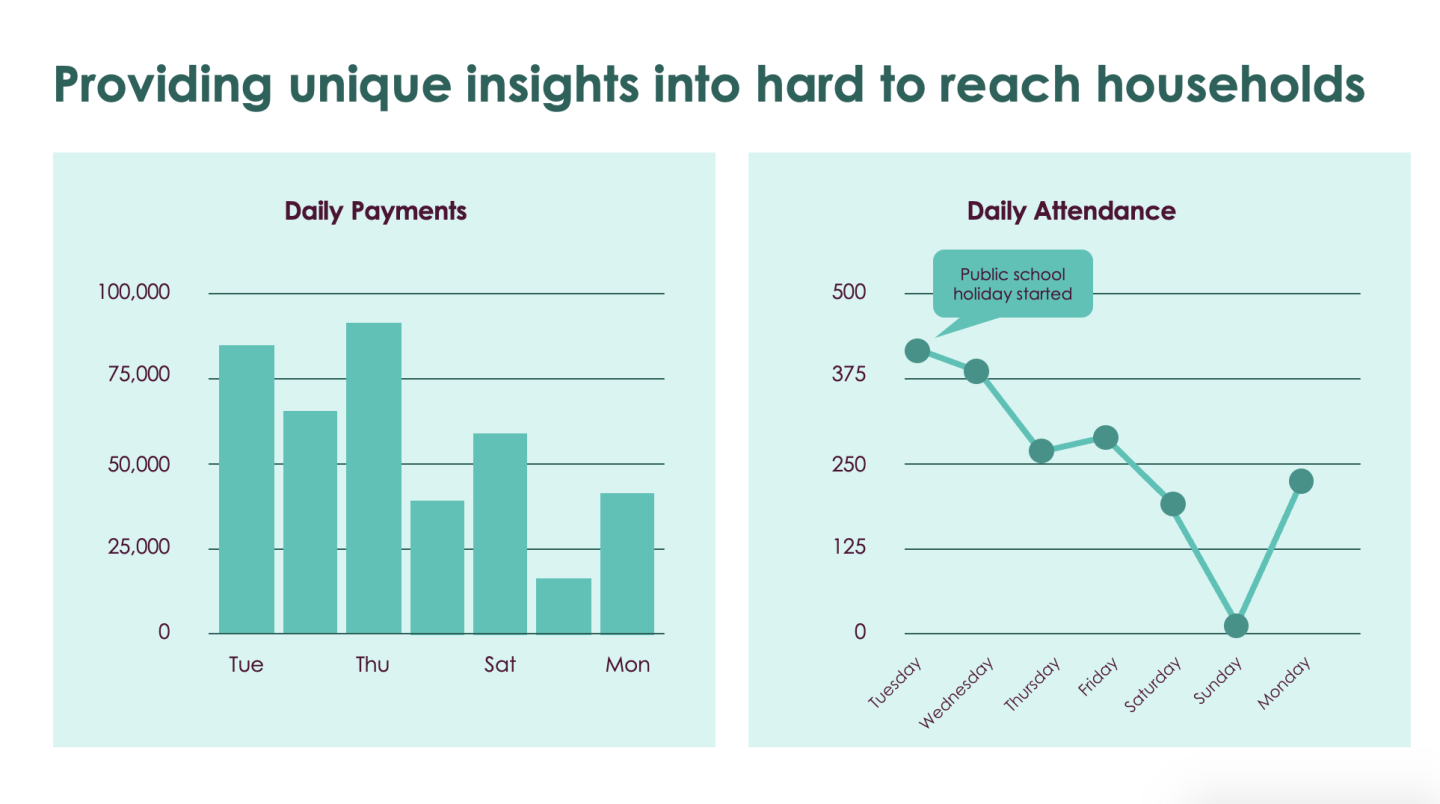
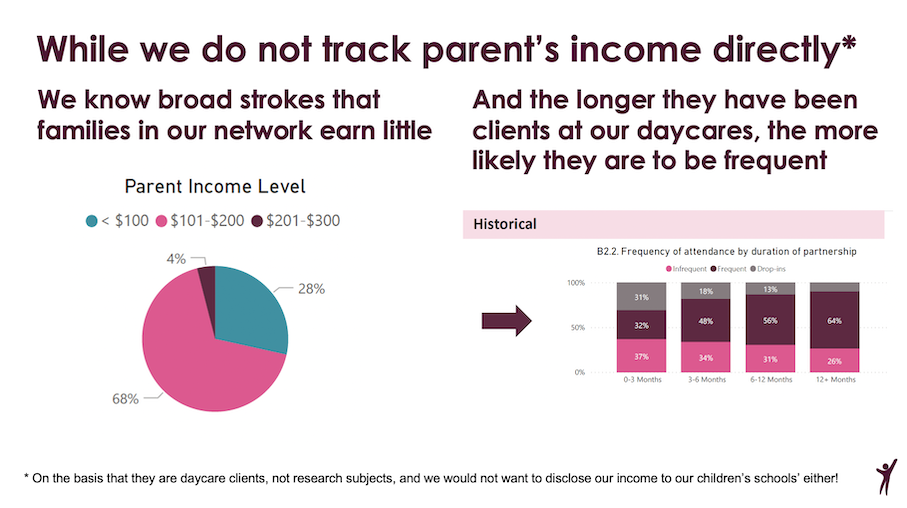
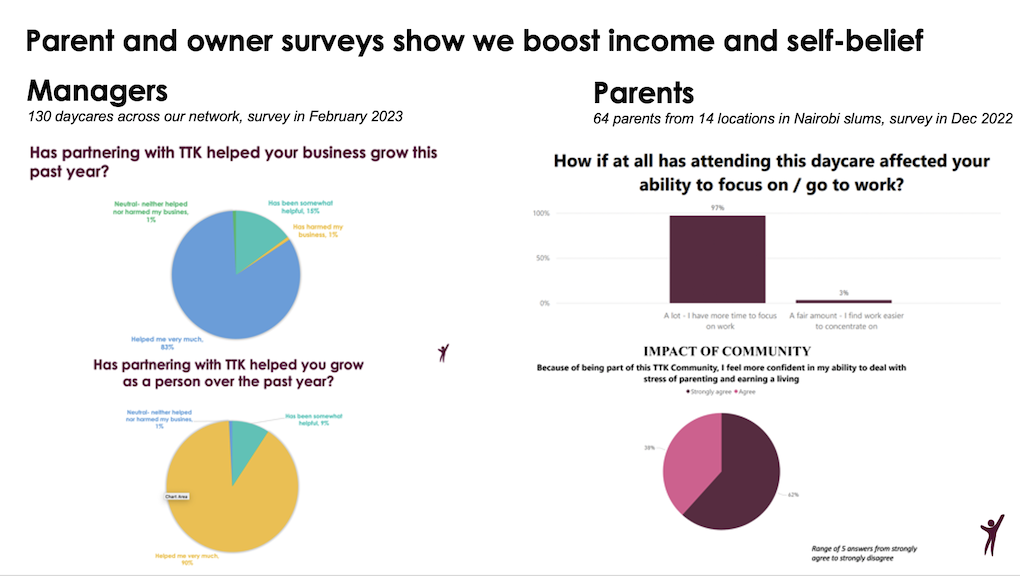

The above is but a snapshot of the monthly data dashboards we update across our 4 domains of impact. We look forward to providing further and deeper insights on our data impacts with the SOLVE team if we are fortunate enough to progress in this application process.
Describe the core technology that powers your solution.
In terms of our technology, we utilize:
- custom built apps (Mtoto Manager, Mtoto Parent and Tiny Totos Field Worker)
- an eLearning site
- SMS software and WhatsApp for network communication
Specifically, the custom built apps support the following features and information:
Mtoto manager app - key features:
Dashboard: Daycare at a glance
Money matters: Economic insights
Payment: Individualized payment schemes
Attendance: Child check-in and pick-up
Loyalty points: TTK loyalty wallet and usage
Loans: Balance and payment schedule
Network: Performance vs. peer network (so they can measure their performance against the average performance across the network)
Mtoto Parent App - key features:
Dashboard: Daycare usage at a glance
Daycare: Attendace and meal consumtion
Loans and loyalty points: TTK balance
Health and Growth monitoring: Reports
Guardians: Primary and secondary profiles
Vaccinations: Records and outstanding
Field worker:
Dashboard: Tasks at a glance
Activity schedule: Tasks planned and overdue
Daycare information: Daycare location, contact information and additional comments
Information: Site assessments, health assessments, development assessments of children.
The managers collect all data for the mtoto app - we can view the basic analytic from the backend of the app, as per the image below:
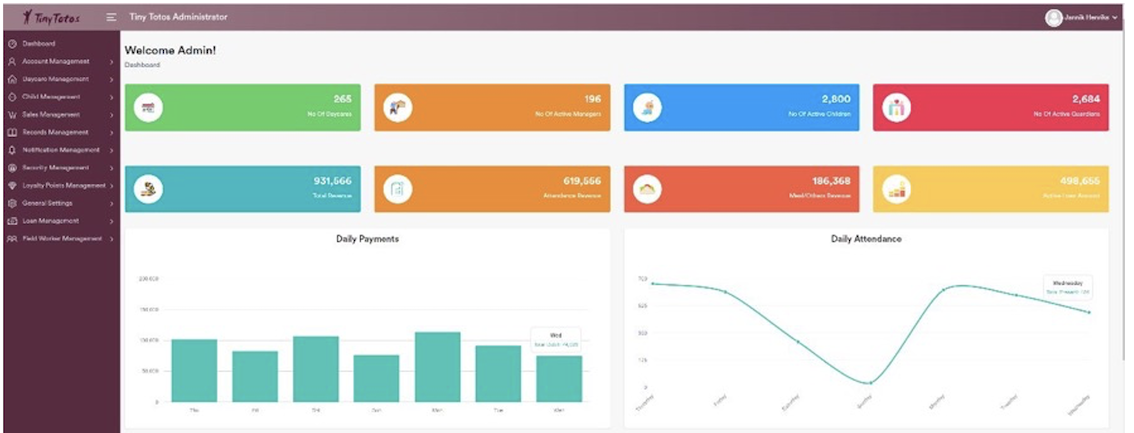
The parents app is a viewer portal, not data collection tool. The field worker (our staff) collect data on children and the facility. So in terms of our data buckets described above:
1. Childcare service - TTK field staff
2. Business metrics - owners
3. Childcare outputs - TTK field staff
4. Parent engagement - combination of data collected by managers, field staff and back office staff (data, tech, comms) on parental engagement indicators (attending meetings, activity on the app, purchase of items etc)
All data is then fed into our power BI dashboard for cross platform analytics with greater breadth of visualization and broader parameters than the app back end, as per the snap shot below:

All user owned data (on own child, own customer practices, manager / business owner metrics) is shared back with owner / creator of this data. We have created both user-friendly tech tools and a democratized data loop so that members of the network - not just TTK, or TTK's donors - can create the data story, and see what it is telling us. Our technology is not the most intricate or groundbreaking, but it is thoroughly unique to create this type of app and tool to the type of user and market we serve. If successful with SOLVE, we look forward to learning more about strategies to democratize data and technology tools and access so we can continue to build our network and give opportunity for improved childcare service, payments and financing for better childcare through constantly improving tools and platforms. Over time, as our analytics further improve, we may be able to adjust our credit rating scheme - which currently defines creditworthiness based on a payment and attendance threshold - to create more nuanced and flexible conditions around user eligibility, to expand access to credit across our network even further.
Which of the following categories best describes your solution?
A new application of an existing technology
Please select the technologies currently used in your solution:
If your solution has a website or an app, provide the links here:
www.tinytotos.com https://mtotolearn.tinytotos.com/
In which countries do you currently operate?
In which countries will you be operating within the next year?
What type of organization is your solution team?
Hybrid of for-profit and nonprofit
How many people work on your solution team?
53 - 20 full time, 23 part
How long have you been working on your solution?
The idea for Tiny Totos began in 2012. We got our first funding (from Grand Challenges Canada) in 2014. we registered as company limited by guarantee in 2016. We registered mtoto technologies which owns our technology platforms in 2021.
What is your approach to incorporating diversity, equity, and inclusivity into your work?
Tiny Totos believes that the marginalization of lower income women in slums will only be reversed once women are given tools to overcome ingrained societal economic subservience. We see women’s success in business as a critical lever to achieving gender parity in status and opportunity and realizing SDG 5 – achieving gender equality and empowerment for all women and girls. Seeing the road to gender equity supported by women’s economic empowerment, Tiny Totos’ gender policy and vision states:
“By empowering female daycare entrepreneurs whose service unlocks the earning potential of working mothers in slums, we empower women’s to reverse gender disparities through economic and hence social empowerment, while increasing opportunity for the next generation of female (and male) leaders’
We walk the walk of inclusion. Our team is 75% female and 90% Kenyan; part-time 95% female and 100% Kenyan. Our board is 60% women; our CEO is a woman. We have 1 white male on our team (Danish, resident in Kenya). While none of our staff are disabled, some of our daycare managers and children are. Our technology platforms enable disabled women and children to participate and learn in our network, even when physical disabilities prevent them from participating to the same degree as their able-bodied counterparts.
We are also inclusive in our work, and will partner with any partner interested in accessing our care network and unique channels of access to disadvantaged women and children to deliver services and products that boost livelihoods and can take advantage of economies of scale and our Know your Customer screening systems to save money and outcome to our members.
What is your business model?
We provide value to our members in multiple ways. As an evidence-based organization, we have ample data affirming our approach, including:
· Almost 18,000 children benefitted from quality childcare and learning in our partner daycares by end of December 2022
· 86% of our 200 partner daycares are profitable, with almost $600,000 USD in micro childcare sales tracked. 75% sell additional services, primarily meals. 86% are on the mtoto app
· 82% of children in 2022 met age-appropriate development milestones
· 76% children show no signs of malnutrition
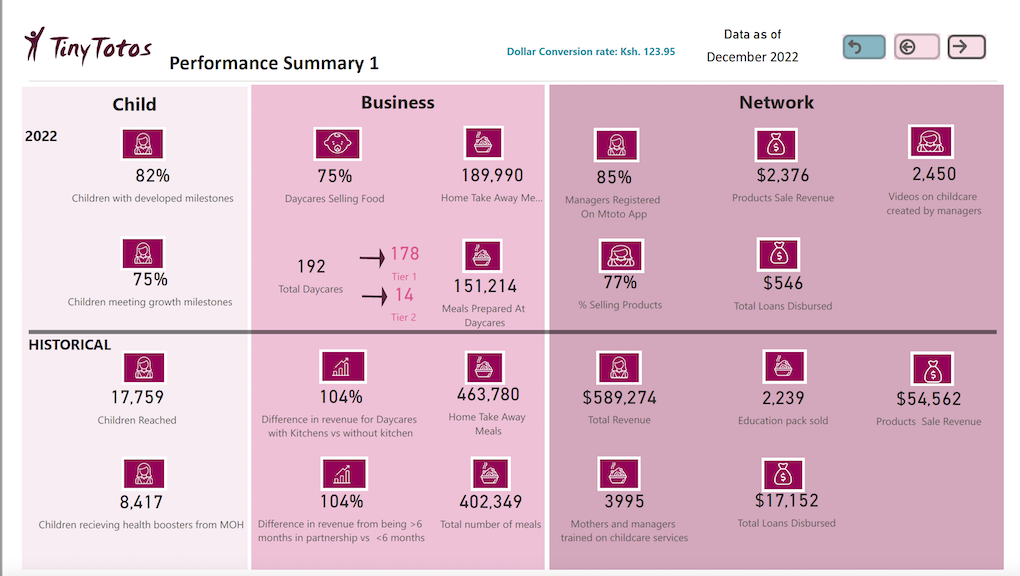
Beyond quantifiable tracked benefits, we provide users value in terms of support, network, community. In December 2022 we conducted a user satisfaction survey of 130 managers owning daycares in the network; in January 2023 we conducted a parent user satisfaction survey. A selection of the answers are provided below - speaking to the value our network members from a financial as well as community membership perspective.
Manager feedback


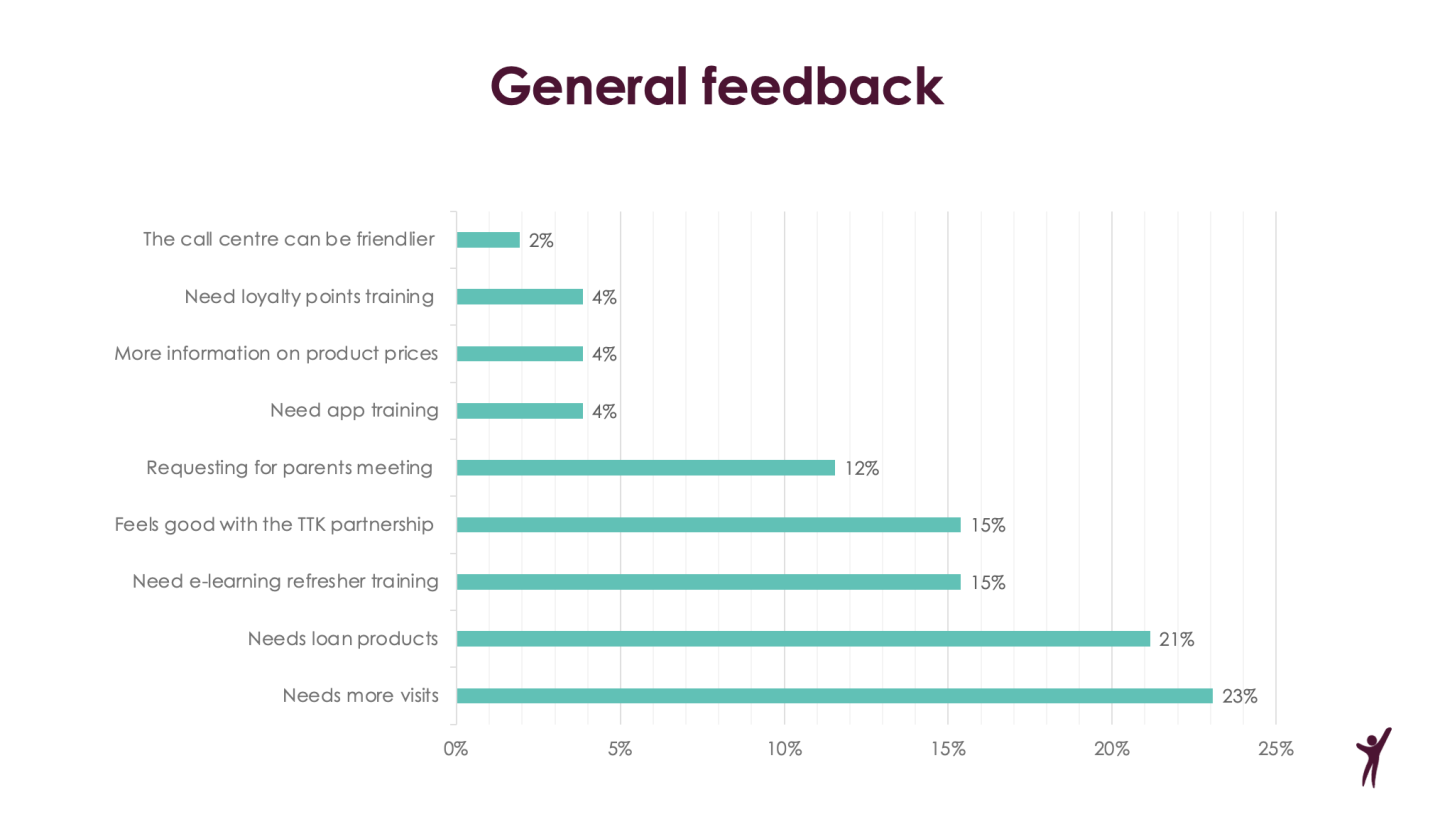
Note loan products is the second most cited area managers would want us to give more options for (ie provide make more products available with finance). With half a person in charge or the loan scheme, our expansion capabilities are however quite limited; with SOLVE's funding and technical support, we see ample opportunity to both expand our credit rating analytics and financing capabilities, to build a larger portfolio of evidence around our model that can lock down a formal financing partner to work with us, and scale our scheme exponentially.
Parent survey feedback
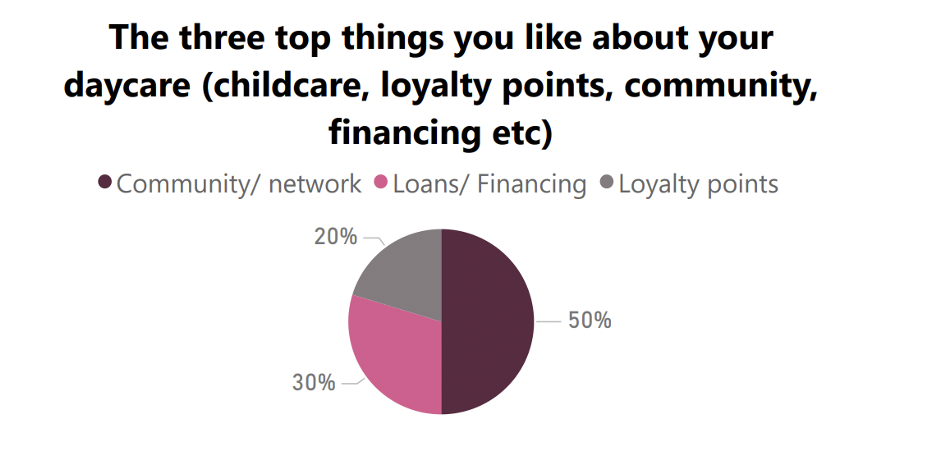

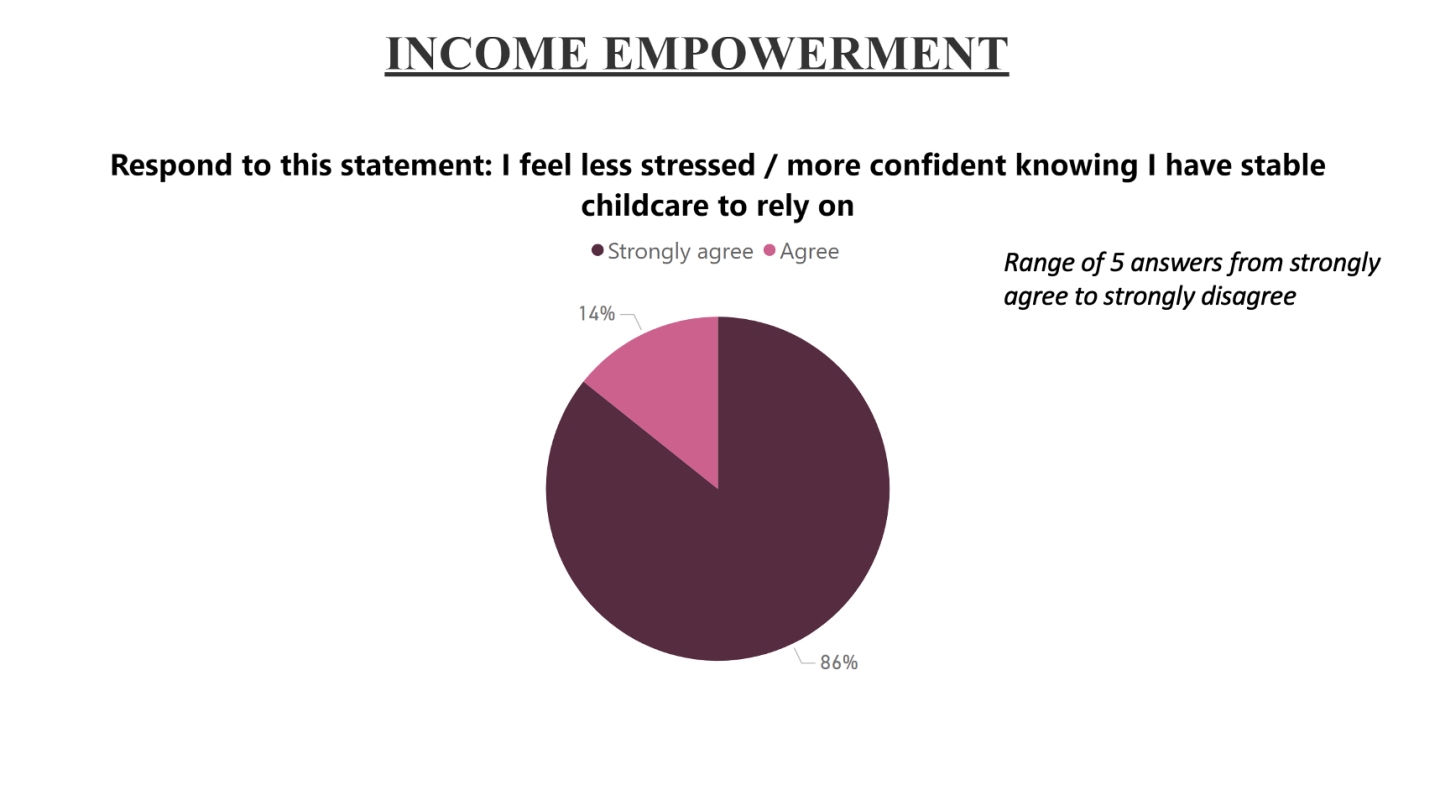
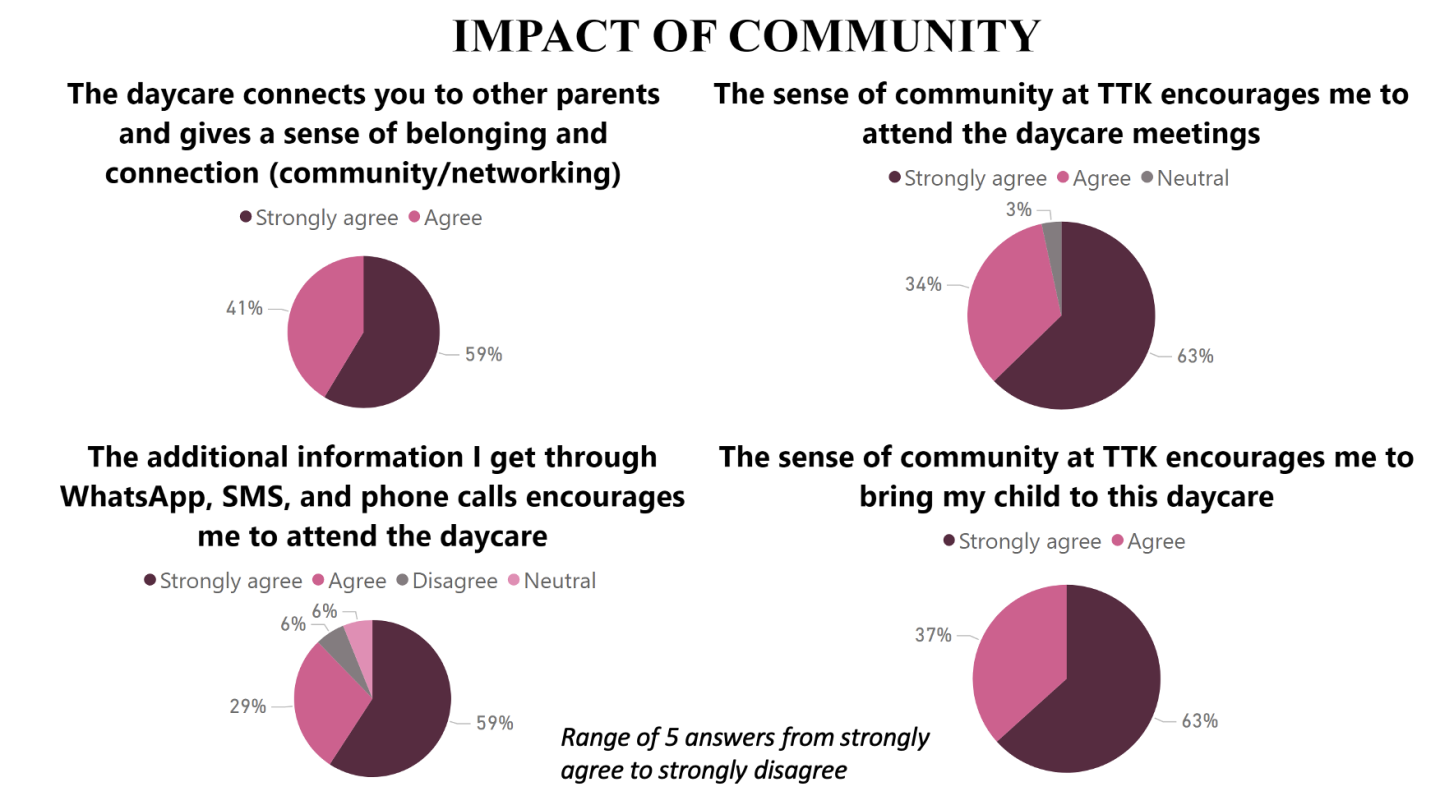

As shown by these charts, we have ample evidence that the products and services we give our community - improved daycare, access to finance, access to community, access to loyalty points (parents earn for spending at the daycare and can redeem points for free services or pay off loans; managers earn from hitting key business and impact metrics and can pay off loans or membership fees with points) and more are appreciated by network members. Members value these services because they already buy them anyway - childcare, food, household equipment, loans - just at higher prices, in unstable settings, with poor quality, and no sense of network. We have not invented their needs, nor have we created the childcare network - we are merely enhancing what already exists, which is why user engagement is so strong. We still have much to do - ie finalizin our e-learning platform, localizing our digital learning and tracking (3xapp) tools in be positioned to replicate our model throughout Kenya, East Africa and beyond, finding a financing partner to scale our loans portfolio with. With SOLVE's help we aim to achieve all these goals, and replicate our proven childcare intervention model and social franchise throughout the region to help 1 million children and women access quality childcare, while solving their own sustainability goals through an enhanced childcare network operating at economies of scale.
Do you primarily provide products or services directly to individuals, to other organizations, or to the government?
Individual consumers or stakeholders (B2C)What is your plan for becoming financially sustainable?
The three slides below speak to how we are aiming to move from being primarily philanthropically / grant revenue dependant to creating different channels of earned revenue and monetization at scale that will enable us to be self-sustaining / profitable, as well as make money from those who can afford it - either consultancy revenues from large development agencies / companies or many many micro payments for parents and managers in and beyond the childcare network. In terms of business and revenue model, Tiny Totos is primarily an entrepreneur / market aggregator business.
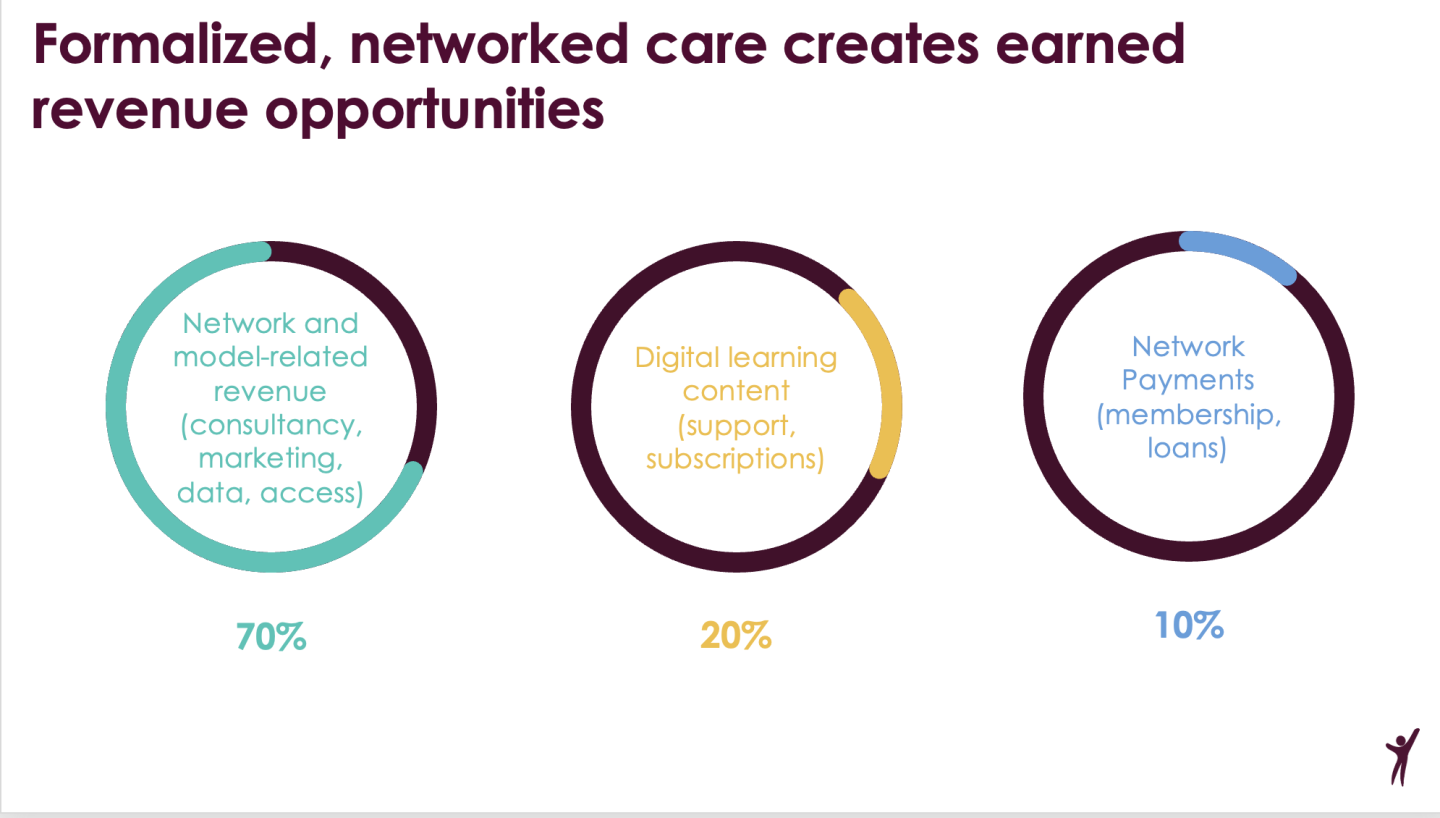
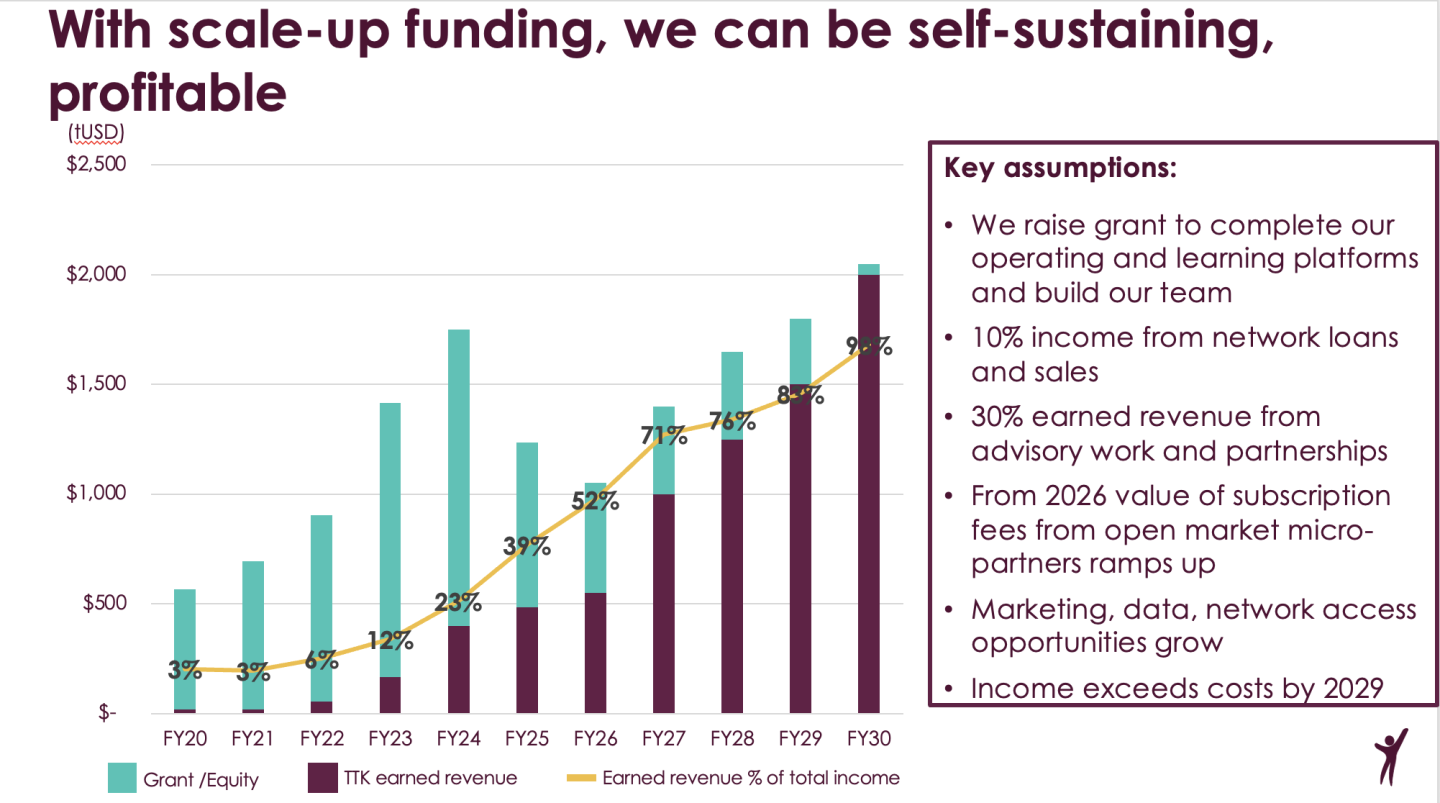
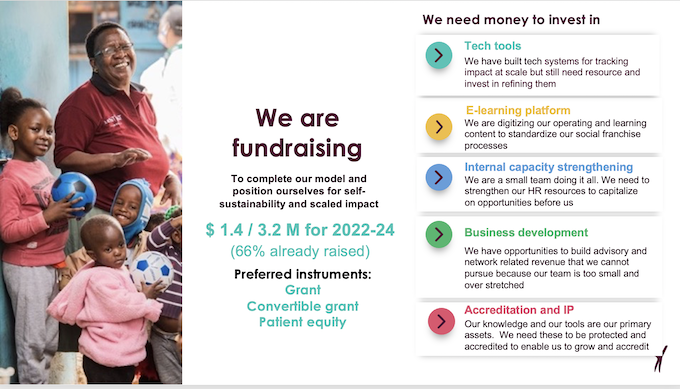
Solution Team
-
Emma Caddy Founder, CEO, Tiny Totos
to Top

Our Organization
Tiny Totos Kenya